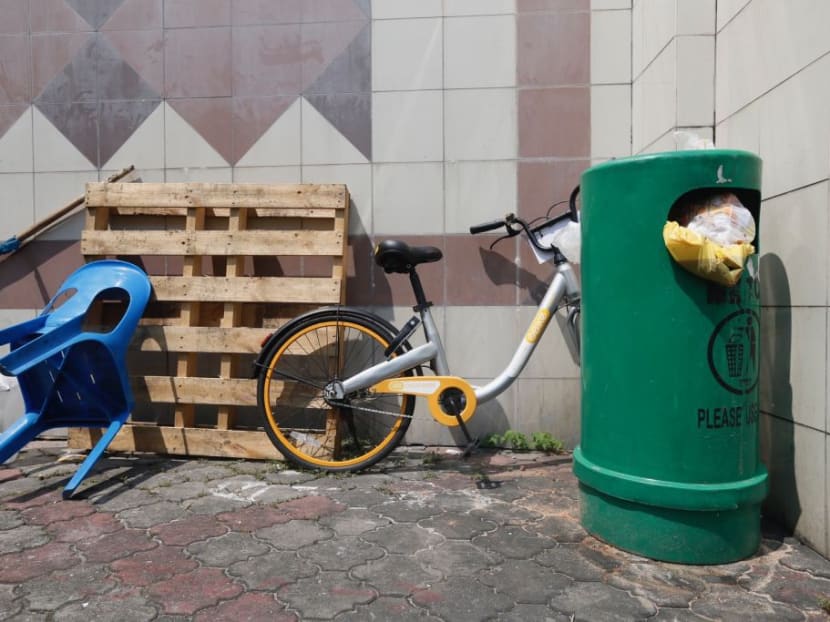Bike-sharing firms worry about costs of complying with new laws
SINGAPORE — After new laws were proposed to tackle the indiscriminate parking of shared bikes and personal mobility devices (PMDs), operators expressed concerns over the compliance costs and the impact on business, while transport experts said that errant users are equally responsible and should be sufficiently penalised.
SINGAPORE — After new laws were proposed to tackle the indiscriminate parking of shared bikes and personal mobility devices (PMDs), operators expressed concerns over the compliance costs and the impact on business, while transport experts said that errant users are equally responsible and should be sufficiently penalised.
Among other things, proposed changes to the Parking Places Act tabled on Monday (March 5) will require operators offering dockless shared bikes, PMDs and power-assisted bicycles to be regulated under a new licensing regime. The Land Transport Authority (LTA) will have more power to fine or sanction errant operators, such as by revoking their licences or curtailing their fleet size.
Homegrown bike-sharing outfit oBike, which has a fleet of some 14,000 bikes, is concerned that the proposal to license and slap fines on operators could “put the brakes” on the Government’s goal to get people to move away from being reliant on cars.
Mr Tim Phang, oBike Singapore’s general manager, said: “The move to introduce licensing regimes instead of educating users, places a heavy burden on start-ups, which in turn means that bike-sharing users will suffer."
"This will mean that existing public and private transport options will be forced to capacity and this could put the brakes on moving Singapore towards a car-lite future,” he added.
Failure to comply with the new regulations can result in operators facing fines of up to S$100,000, reductions in fleet size, suspension, or even a revocation of their licence.
Not only will operators need to review their fleet and business models, some of these costs may be passed down to users eventually, Mr Phang said, making it more expensive to use bike-sharing services.
One of the proposed changes is to implement geo-fencing technology, requiring users to scan a unique Quick Response (QR) code at designated parking spots as proof of proper parking.
SG Bike’s marketing director Benjamin Oh said that this could add to operators’ compliance costs. “We may need to make changes, to make our app compatible with this measure… (Another downside is that) QR codes (can) be easily damaged or replaced,” he said.
SG Bike, which has a fleet of about 1,500, uses geo-station technology to track and retrieve bicycles that are not parked within allotted parking zones.
Last week, it announced a partnership with telecommunications company M1 to enhance the accuracy of data collected through RFID (radio frequency identification) technology, so that improperly parked bikes can be removed more efficiently.
Mr Oh, who agreed that legislation is a “necessary step” to ensure the success of the bike-sharing industry here, hopes to present this initiative to the LTA as a “viable alternative” to the QR code proposal.
The cost of redeveloping technology to comply with the upcoming regulations was also raised by Mr Kelvin Ng, co-founder of e-scooter sharing firm PopScoot. Such costs could be too “onerous” for service providers here which are mostly start-ups, he said.
“Given their entrepreneurial nature and the nascent stage of the market, the cost to these local pioneering enterprises could be better considered.”
Mr Ng suggested increasing the length of ban for recalcitrant users who repeatedly flout parking rules.
GET HARSH ON END-USERS
Transport experts interviewed by TODAY said that for the proposed regulations to be effective, they must focus on curbing users’ behaviour.
Dr Park Byung Joon, who specialises in urban transport research at the Singapore University of Social Sciences, said: “I think (the proposed laws) can go further, for instance, to allow the authorities to fine the shared-bike users as well.
“If someone rents a car and is caught speeding or parking illegally, you fine the driver and not the car rental firm. The same concept should apply to shared bikes.”
Dr Park agreed that the proposal to limit operators’ fleet size could also be effective in ensuring that operators hold errant users accountable, lest their potentials to expand in the market be adversely affected.
On why the authorities are introducing legislation at this point in time — almost two years after the first bike-sharing firms entered the market — Dr Park said that the Government had adopted a light-touch approach initially because it wanted to encourage more people to use shared bikes.
“Now they are responding to concerns that have arisen,” he said.
Commenting on the legislative moves, Mr Tham Chen Munn, an anaylst with transport solutions firm PTV Group, said that they could be seen by some as “reactive”, even though the Government “needed time to observe how the industry was shaping up and to come up with appropriate measures”.
Mr Tham also agreed that more stringent measures can be proposed to take errant users to task.
Undergraduate Clare Lim, 24, who regularly uses shared bikes, said that the new regulations could inconvenience users of these bikes: “If there are not many places for me to park the bikes, then I’ll have to consider if I want to use it. If it’s too much of a hassle, then it will slow down my travel time instead of helping me to save time.” ADDITIONAL REPORTING BY LOUISA TANG







